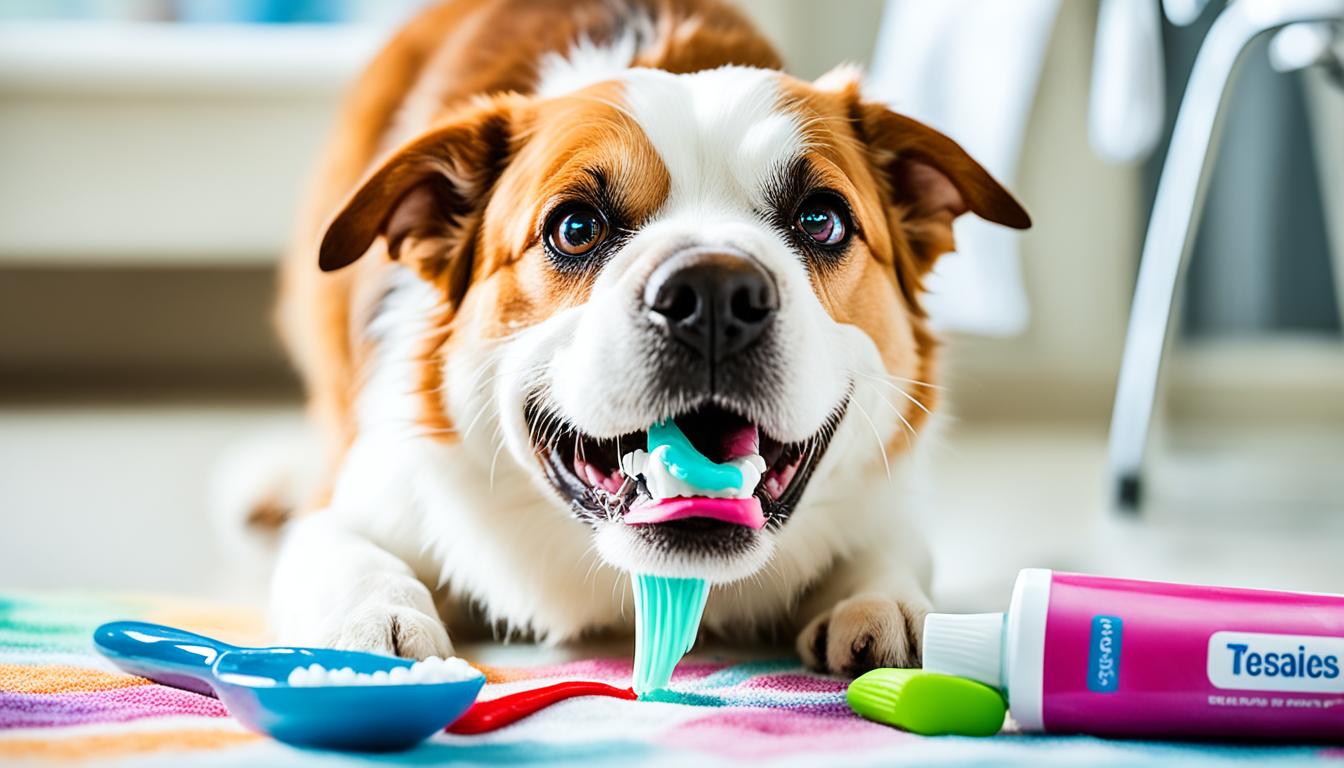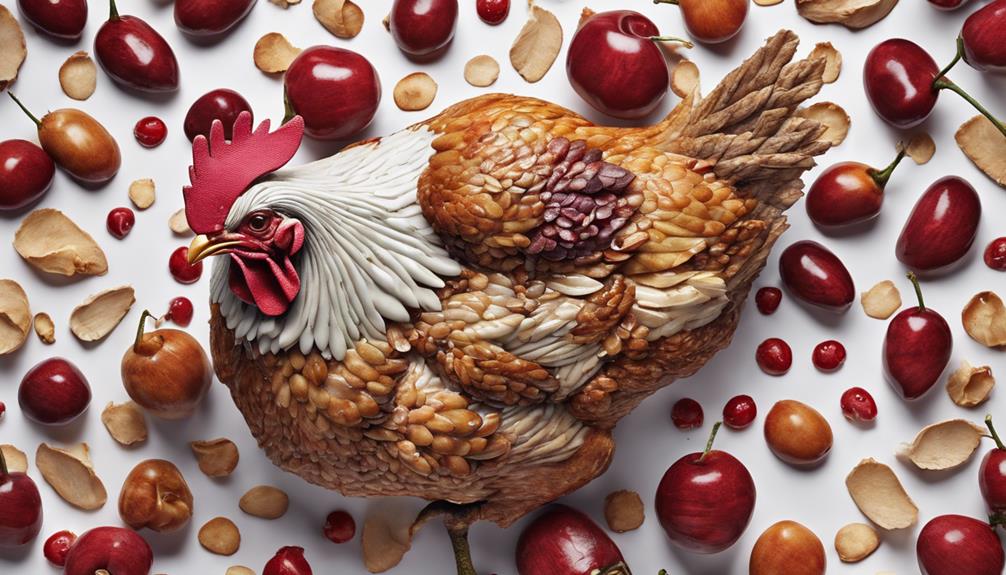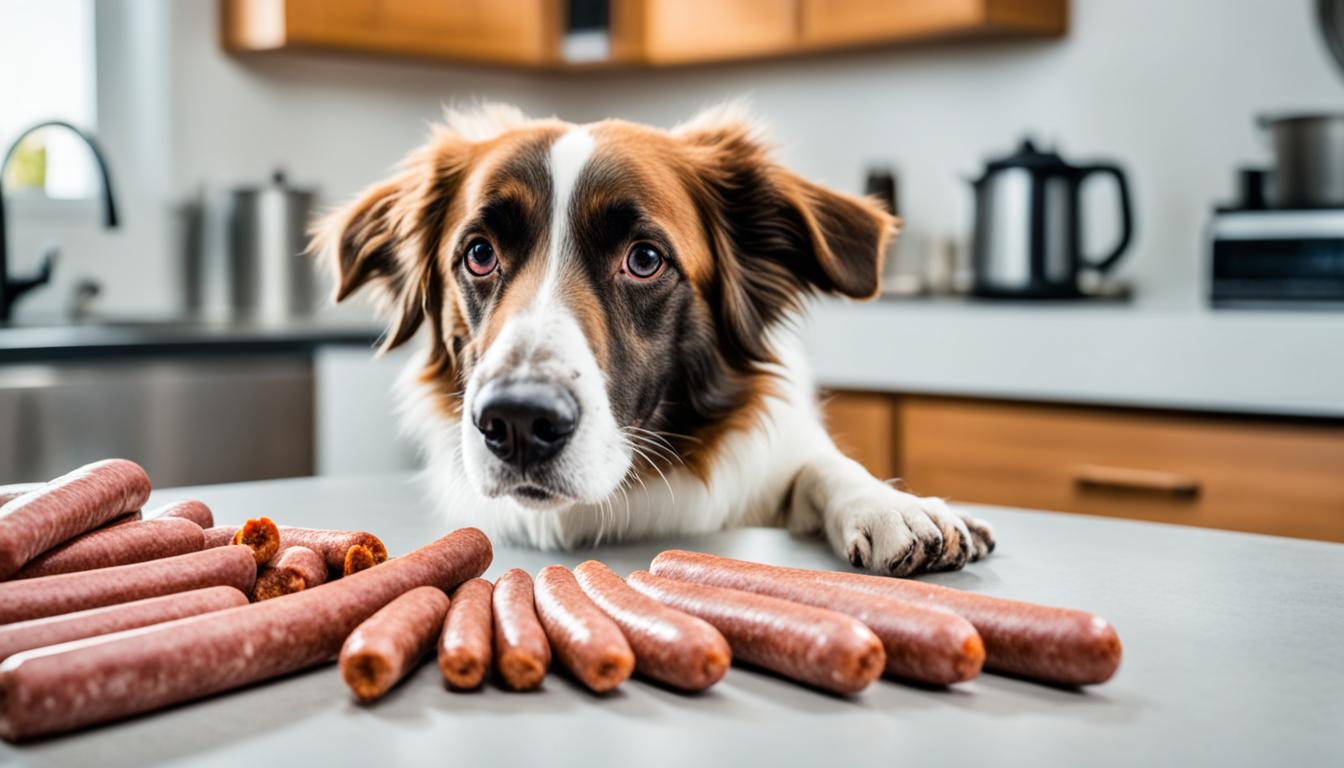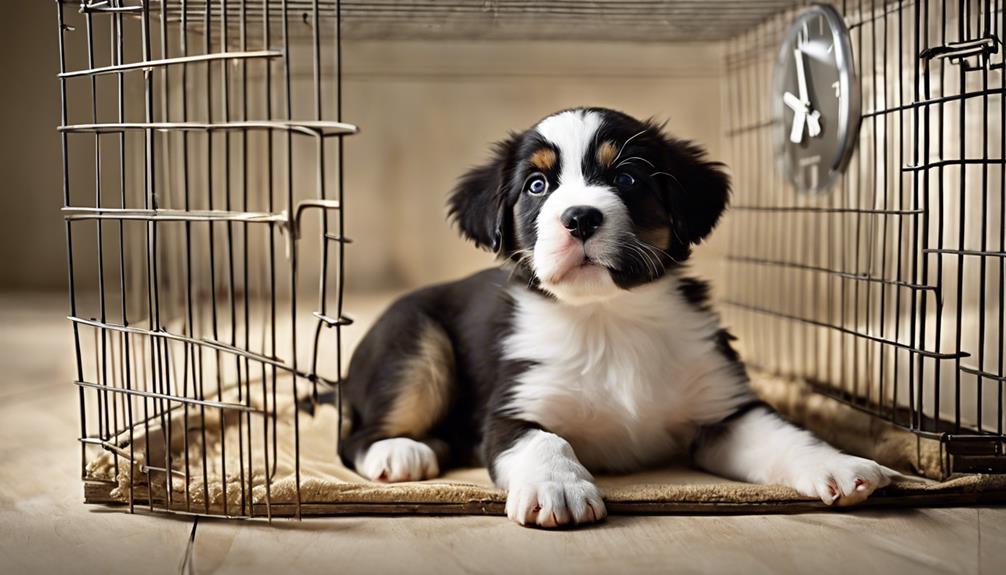Did you know that by the age of three, 80% of dogs display signs of canine periodontal disease? Even though it is common, many pet owners tend to neglect their dog’s dental hygiene. However, it is essential to brush your dog’s teeth regularly to avoid issues like bad breath, decayed teeth, and gum disease. By integrating basic dental care routines into your daily schedule, you can guarantee that your dog maintains healthy teeth and a bright smile.
Key Takeaways:
- Regularly brushing your dog’s teeth can prevent dental issues such as bad breath, decayed teeth, and gum disease.
- Choose a suitable time and place where your dog feels comfortable for teeth brushing.
- Use a soft-bristled toothbrush and dog-specific toothpaste.
- Alternative dental care options include dental chews, dental sprays, and chew toys.
- Regular professional cleanings by a veterinarian are essential for optimal oral health.
Tips to Brush Your Dog’s Teeth
When it comes to maintaining your dog’s dental health, regular tooth brushing plays a key role in preventing oral issues and maintaining fresh breath. By following these tips, you can ensure a successful and stress-free tooth brushing experience for your furry friend.
Choose the Right Time and Place
It’s important to select a calm and quiet environment where your dog feels comfortable and focused. Find a location that allows both you and your dog enough space to maneuver during the brushing process.
Use the Right Tools
Invest in a dog-specific toothbrush with soft bristles and angled handles that will effectively reach all areas of your dog’s mouth. Avoid using human toothbrushes, as they may contain bristles that are too harsh for your dog’s gums. Alongside a toothbrush, be sure to use dog-specific toothpaste, as human toothpaste contains ingredients that can be harmful to dogs if swallowed.
Introduce Gradually
To ease your dog into the tooth brushing routine, it’s important to introduce the toothbrush and toothpaste gradually. Start by allowing your dog to sniff and lick the toothpaste off your finger, familiarizing them with the taste and texture. Then, progress to touching their teeth and gums with the toothbrush, without applying too much pressure.
Brush in a Gentle and Systematic Manner
Once your dog is comfortable with the toothbrush, begin brushing in a gentle and systematic manner. Start with the front teeth and gradually move to the sides and back teeth. Use short, circular motions to effectively clean each tooth and remove any plaque or food particles. Remember to be patient and take breaks if needed.
Praise and Reward
Throughout the tooth brushing process, it’s crucial to praise and reward your dog for their cooperation. Positive reinforcement, such as treats or verbal praise, will help create a positive association with tooth brushing and make it a more enjoyable experience for your dog.
“Regular tooth brushing is an essential part of maintaining your dog’s oral health. By following these tips, you’ll be able to keep your dog’s teeth clean and prevent dental issues.”
| Benefit | Explanation |
|---|---|
| Prevents Plaque and Tartar Buildup | Regular brushing helps remove plaque and prevents the formation of tartar, which can lead to gum disease and tooth decay. |
| Reduces Bad Breath | Brushing helps eliminate odor-causing bacteria in your dog’s mouth, resulting in fresher breath. |
| Prevents Periodontal Disease | Proper dental care reduces the risk of periodontal disease, which can lead to tooth loss and other serious health issues. |
| Improves Overall Health | Poor dental hygiene can contribute to other health problems, such as heart and kidney disease. Regular brushing helps maintain your dog’s overall well-being. |
Alternative Dental Care
If brushing your dog’s teeth is challenging, don’t worry! There are alternative dental care options available that can still contribute to your dog’s oral health.
Dog dental chews are tasty treats that your dog will love, and they also help clean their teeth and reduce plaque and tartar buildup. These chews not only satisfy your dog’s cravings but also provide a fun way to maintain their oral hygiene.
Dog dental sprays are another great option. You can use them alone or in between brushings to freshen your dog’s breath, kill plaque-causing bacteria, and remove tartar. Simply spray the solution into your dog’s mouth, and they’ll have fresh breath in no time.
If your dog loves to chew, chew toys for dogs are an excellent choice. Not only do they provide mental stimulation and prevent boredom, but they also help naturally clean your dog’s teeth. As your dog chews on the toy, it helps to remove plaque and tartar, promoting better dental health.
It’s important to note that while dental chews, sprays, and chew toys can aid in maintaining your dog’s oral health, they are not a substitute for regular toothbrushing. These alternatives should be used in conjunction with a proper dental care routine that includes brushing your dog’s teeth.
Benefits of Alternative Dental Care:
- Helps maintain oral hygiene
- Reduces plaque and tartar buildup
- Freshens your dog’s breath
- Provides mental stimulation and prevents boredom
Remember to supervise your dog when giving them dental chews or using dental spray to ensure their safety. Now, let’s take a look at some information about professional veterinarian cleanings in the next section.
| Dental Care Option | Key Features |
|---|---|
| Dog Dental Chews | Tasty treats that clean your dog’s teeth and reduce plaque and tartar buildup |
| Dog Dental Sprays | Help freshen your dog’s breath, kill plaque-causing bacteria, and remove tartar |
| Chew Toys for Dogs | Provide mental stimulation and naturally clean your dog’s teeth |
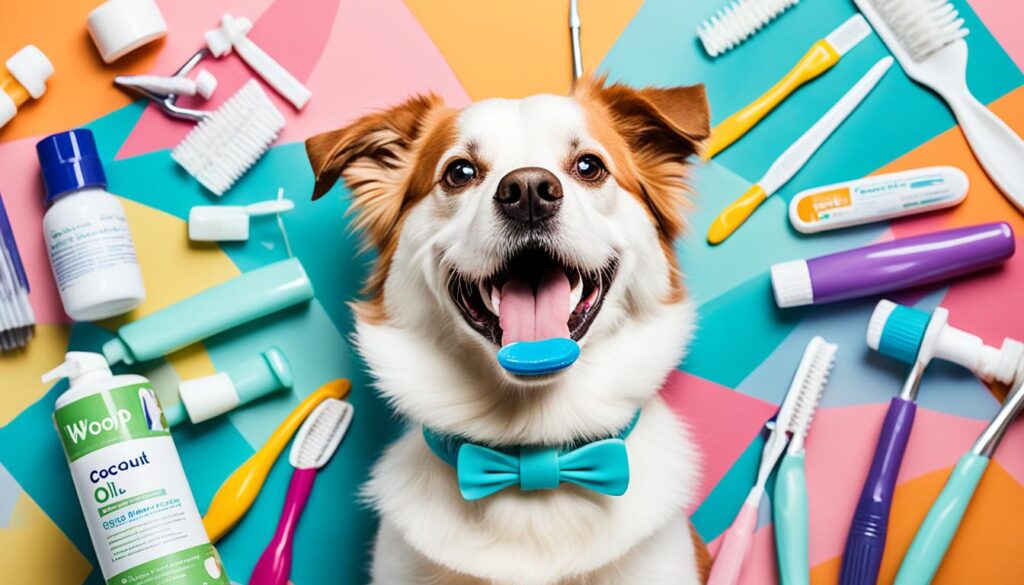
Expert Tip
“While alternative dental care options can be beneficial, it’s essential to remember that they should complement regular toothbrushing as part of a comprehensive dental care routine for your dog.”
Regular Professional Veterinarian Cleanings
Maintaining exceptional oral health for your furry friend sometimes requires more than regular brushing at home. That’s why it’s crucial to schedule regular professional dental cleanings for your dog with a trusted veterinarian. These cleanings go beyond what you can do at home and provide a thorough examination, cleaning, and treatment of any potential dental issues.
During a professional dental cleaning, veterinarians utilize their expertise to identify, prevent, and address dental problems that may have gone unnoticed. They have the knowledge and tools to remove plaque below the gum line, take x-rays, scale and polish teeth, and perform necessary dental procedures like extractions when needed. Veterinarians can also detect early signs of serious dental issues that can greatly impact your dog’s overall well-being.
Most dogs require oral exams and professional cleanings at least once a year. However, certain breeds, such as Bulldogs, Yorkshire Terriers, and Dachshunds, are more susceptible to periodontal disease and may require more frequent cleanings. By prioritizing regular professional cleanings, you can stay one step ahead of potential dental problems and ensure optimal oral health for your canine companion.
Benefits of Regular Professional Veterinarian Cleanings:
- Expert identification and treatment of dental issues
- Removal of plaque and tartar below the gum line
- X-rays for a comprehensive assessment
- Scaling and polishing of teeth for a clean and fresh mouth
- Potential dental procedures like extractions when necessary
While professional dental cleanings may require an investment of both time and money, they are an essential part of maintaining your dog’s oral health. They provide a level of care and expertise that cannot be replicated at home, ensuring your dog’s teeth and gums are in the best possible condition.
| Benefits of Regular Professional Veterinarian Cleanings |
|---|
| Expert identification and treatment of dental issues |
| Removal of plaque and tartar below the gum line |
| X-rays for a comprehensive assessment |
| Scaling and polishing of teeth for a clean and fresh mouth |
| Potential dental procedures like extractions when necessary |

By prioritizing regular professional veterinarian cleanings, you are taking proactive steps to prevent potential health issues and ensure that your dog maintains excellent oral hygiene. Your veterinarian will provide personalized care and guidance based on your dog’s specific needs, helping you create a dental care routine that promotes long-term oral health.
What to Do if Your Dog’s Teeth Are Stained
If your dog’s teeth are severely stained or covered in tartar, it may be time to consider a professional veterinary dental cleaning. While regular brushing at home can help prevent the buildup of stains and tartar, there are instances where professional intervention is necessary to completely remove them.

Professional dental cleanings are performed by veterinarians who have the expertise and tools to effectively clean your dog’s teeth. They can remove stubborn stains and tartar that regular brushing may not be able to address. This procedure is typically done under anesthesia to ensure your dog remains calm and comfortable throughout.
“Professional dental cleanings are performed by veterinarians who have the expertise and tools to effectively clean your dog’s teeth.”
After a dental cleaning, it’s crucial to continue maintaining your dog’s dental hygiene. This includes brushing your dog’s teeth daily to prevent future stains and tartar buildup. By establishing a consistent brushing routine, you can help delay or even eliminate the need for another professional cleaning in the future.
In addition to daily brushing, there are other dental care practices you can incorporate to maintain your dog’s oral health. This may include providing dental chews, using dental sprays, and offering chew toys that promote dental hygiene. These alternative methods can supplement regular brushing and contribute to overall dental wellness.
Routine Dental Care for Stained Teeth
When it comes to maintaining dental hygiene for dogs with stained teeth, following a routine dental care plan is essential. Here is an example of a daily dental care routine:
| Step | Description |
|---|---|
| 1 | Brush your dog’s teeth daily using a dog-specific toothbrush and toothpaste. |
| 2 | Introduce dental chews or treats designed to promote dental health. |
| 3 | Consider using a dental spray to freshen your dog’s breath and reduce bacteria. |
| 4 | Provide chew toys that help remove plaque and tartar buildup. |
| 5 | Maintain regular veterinary visits for oral exams and professional cleanings. |
By implementing this dental care routine, you can effectively manage stained teeth and maintain your dog’s oral health.
Getting Your Dog Used to Dental Care
Some dogs may have a fear or resistance to having their teeth brushed. To overcome this, a desensitization program can be implemented. Start by selecting a designated location, such as a bathroom, and associate it with positive experiences for your dog. Gradually introduce your dog to the toothbrush and toothpaste by touching their teeth and gums without the brush, allowing them to lick the toothpaste, and eventually brushing their teeth. This process may take time and patience, but with consistent training and positive reinforcement, your dog can become more comfortable with dental care.
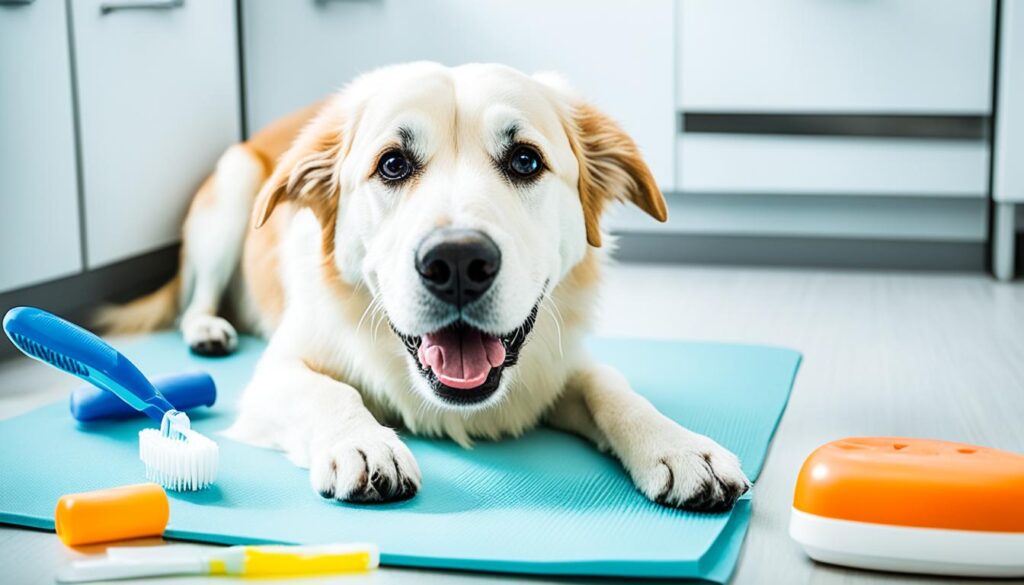
Training your dog to accept teeth brushing can be a gradual process. Here is a step-by-step guide to help you desensitize your dog to dental care:
- Select a quiet and comfortable location, such as a bathroom or a specific area in your home, to associate with teeth brushing.
- Make the dental care routine a positive experience by praising and rewarding your dog with treats or petting during and after each session.
- Gently introduce your dog to the toothbrush by letting them sniff it and touch it to their lips and gums.
- Allow your dog to lick dog-specific toothpaste to familiarize them with the taste and texture.
- Gradually start brushing your dog’s teeth using small circular motions on the front, back, and sides of their teeth.
- Progressively increase the duration and intensity of the brushing sessions as your dog becomes more comfortable.
- Continue to provide positive reinforcement and rewards throughout the desensitization program.
Remember, consistency and patience are key to successfully train your dog for teeth brushing. By implementing a desensitization program, you can help your dog overcome their fear or resistance and ensure regular dental care for their optimal oral health.
Why Clean Your Dog’s Teeth?
Regular dental care for your dog provides more than just fresh breath. It plays a vital role in maintaining their overall health and well-being. Taking care of your dog’s oral health is essential to prevent tooth loss, oral pain, and potential health complications that can arise from neglected dental hygiene.
Diseased mouths, inflamed gums, and excessive plaque buildup can lead to tooth extraction, leaving your furry friend with gaps in their smile. Severe dental issues can cause discomfort and oral pain, making it difficult for your dog to eat or enjoy their favorite activities.
In addition to the immediate impacts on their oral health, poor dental care can have broader health implications for your dog. Bacteria from plaque can enter their bloodstream, potentially affecting vital organs like the kidneys, liver, and heart.
“A healthy mouth leads to a healthy body. By prioritizing dental care for your dog, you’re not only improving their oral health, but also their overall well-being.”
By incorporating regular dental care practices into your dog’s routine, you’re providing them with the oral health benefits they deserve. Maintaining healthy teeth and gums prevents tooth loss, discomfort, and potential complications that may arise from neglected dental hygiene.
The Importance of Dental Care for Dogs:
- Prevents tooth loss
- Reduces oral pain
- Prevents gum disease
- Reduces the risk of bacterial infections
- Improves overall health
Proper dental care can add years to your dog’s life and improve their quality of life. It’s never too late to start prioritizing their dental health. Whether it’s through regular tooth brushing, alternative dental care methods, or seeking professional dental cleanings, taking care of your dog’s teeth and gums is an investment in their well-being.

The Oral Health Benefits for Your Dog:
Your dog will enjoy a range of benefits when you make dental care a priority:
- Fresh breath
- Reduced plaque and tartar buildup
- Healthy gums
- Reduced risk of dental infections
- Improved overall health and longevity
Regular dental care is an important part of responsible pet ownership. By keeping your dog’s mouth clean and healthy, you can ensure their well-being and prevent potentially serious dental issues down the line.
Conclusion
Maintaining good dental hygiene for your dog is crucial for their overall health and well-being. By following the tips and practices mentioned in this guide, such as brushing your dog’s teeth regularly, using alternative dental care methods, and seeking professional cleanings, you can ensure that your dog has a healthy and fresh smile.
Remember to be patient and consistent in your dental care routine, as it may take time for your dog to adjust to dental care activities. Gradually introduce them to brushing and reward their cooperation with treats or praise. If you encounter any specific concerns or questions, consult with your veterinarian, who can provide guidance tailored to your dog’s individual needs.
By prioritizing your dog’s dental care, you are not only preventing dental problems such as bad breath and tooth decay, but also safeguarding their overall health. Bacteria from dental issues can enter the bloodstream and affect vital organs. With regular dental care, you are promoting your dog’s well-being and improving their quality of life.
